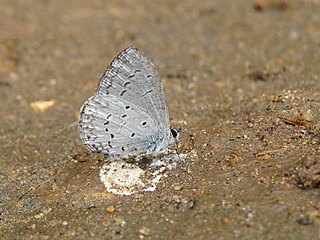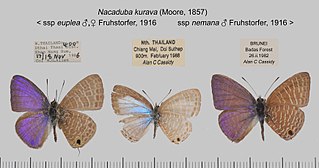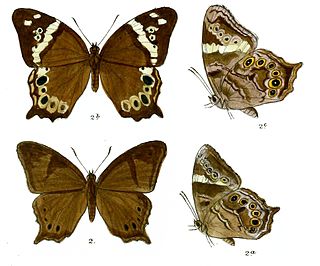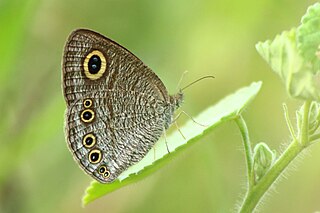
Lampides boeticus, the pea blue, or long-tailed blue, is a small butterfly that belongs to the lycaenids or gossamer-winged family.

Celastrina lavendularis, the plain hedge blue, is a small butterfly found in Sri Lanka, India, and across the Indomalayan realm that belongs to the lycaenids or blues family.

Nacaduba angusta, the white lineblue, is a lycaenid butterfly found in South Asia. The species was first described by Herbert Druce in 1873.

Nacaduba kurava, the transparent six-line blue, is a species of butterfly in the family Lycaenidae found in Asia and Australia. The species was first described by Frederic Moore in 1857.

Nacaduba hermus, the pale four-line blue, is a species of lycaenid butterfly found in Indomalayan realm. The species was first described by Baron Cajetan von Felder in 1860.

Nacaduba pavana, the small four-line blue or Singapore four-line blue, is a species of lycaenid butterfly found in Southeast Asia.

Nacaduba berenice, the rounded six-line blue, is a lycaenid butterfly found in Indomalayan realm. The species was first described by Gottlieb August Wilhelm Herrich-Schäffer in 1869.

Ionolyce helicon, the pointed lineblue, or bronze lineblue, is a small butterfly found in the Indomalayan realm that belongs to the lycaenids or blues family.

Nacaduba is a genus of gossamer-winged butterflies (Lycaenidae). It constitutes many of the species commonly called "lineblues". As they are the genus initially erected to contain all lineblues, they might be considered the "typical" lineblues, as opposed to the species relatives now separated in Catopyrops, Petrelaea and Prosotas.

Sri Lanka is home to 245 species of butterflies with 23 of these being endemic to the island. Of the 245 species, 76, are listed as threatened nationally, while the Ceylon rose is designated as critically endangered.
Lionel Gilbert Ollyett Woodhouse was an English civil servant and naturalist who was the 18th Surveyor General of Ceylon. He was appointed in 1937, succeeding G. K. Thornhill, and held the office until 1943. He was succeeded by R. J. Johnston.

Lethe daretis, the Sri Lanka treebrown, is a butterfly in the family Nymphalidae. It is endemic and restricted to cloud forests of central highlands of Sri Lanka such as Horton Plains.

Lethe dynsate, the Ceylon forester, is a butterfly in the family Nymphalidae. It is endemic to Sri Lanka.

Mycalesis rama, the Cingalese bushbrown, is a species of satyrine butterfly of family Nymphalidae. It is a very shy animal, distributed in bamboo forests. It is endemic to Sri Lanka.

Nacaduba sinhala, the Pale Ceylon line blue, or Ceylon six-lineblue, is a species of Lycaenidae butterfly. It is endemic to Western Ghats complex.

Udara singalensis, the Singalese hedge blue, is a species of Lycaenidae butterfly. It is endemic to Sri Lanka.
Arhopala ormistoni, the Ormiston's oakblue, is a species of lycaenid or blue butterfly. It is endemic to Sri Lanka.
Tajuria arida, the Ceylon indigo royal, is a species of lycaenid or blue butterfly. Once classified as a subspecies of Tajuria jehana, it is endemic to Sri Lanka.

Ypthima singala, the jewel four-ring or Sinhalese five-ring, is a species of Satyrinae butterfly. It is endemic to Sri Lanka and south India.

Appias galene, the Sri Lankan lesser albatross, is a species of Pieridae. It is endemic to Sri Lanka.















